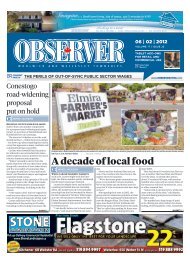08 November 1, 2008 - ObserverXtra
08 November 1, 2008 - ObserverXtra
08 November 1, 2008 - ObserverXtra
Create successful ePaper yourself
Turn your PDF publications into a flip-book with our unique Google optimized e-Paper software.
The Observer | Saturday, <strong>November</strong> 01, 20<strong>08</strong> OPINION | 13<br />
»HARD TALK | RAFE MAIR<br />
Notes on privilege, luck and how nations pull apart<br />
This is, I warn you,<br />
a rambler done<br />
on board a cruise<br />
ship. As I take in<br />
the evening from<br />
our neat, little veranda,<br />
I ask myself,<br />
what the hell am I<br />
doing here? Literally<br />
billions in the<br />
world unable to feed themselves and<br />
I’m sitting beside the love of my life<br />
complaining because it’s a formal<br />
night and I have to wear a tux.<br />
At dinner, I get into a discussion<br />
about affirmative action and am<br />
forced to admit that no one got more<br />
out of affirmative action than I.<br />
Born into a well-off family, partially<br />
educated in a private school, permitted<br />
to get away with failing second<br />
year arts due to a preference for golf,<br />
bridge and women – not necessarily<br />
in that order – then out into a workplace<br />
in which my father knew everyone<br />
who was worth knowing.<br />
That I abandoned my “class” and<br />
the “establishment” (other than<br />
membership in the Vancouver Club)<br />
and that I earned my living fighting<br />
it, doesn’t derogate from the fact that<br />
my very future was due to the affirmative<br />
action and helpful network<br />
my birth gave me.<br />
While I’m not about to take a vow of<br />
poverty complete with sackcloth and<br />
ashes, I must ask who the hell am<br />
I, or any other fortunate people, to<br />
criticize universities and other en-<br />
»INTERNATIONAL AFFAIRS | GWYNNE DYER<br />
Perfidious Albion continues to stymie Chagos Islanders<br />
For arrogance, hypocrisy<br />
and sheer<br />
nastiness, few organizations<br />
in the<br />
world rival the British<br />
Foreign Office.<br />
Exhibit A in the<br />
case against it, for<br />
the past decade, has<br />
been its marathon<br />
legal struggle to deny the former inhabitants<br />
of the Chagos Islands their<br />
rights. Last week, it cheated them<br />
again.<br />
The Chagos Islands, a group of seven<br />
atolls in the middle of the Indian<br />
Ocean, were settled in the late 18th<br />
century by slaves who were brought<br />
there by the French to work in copra<br />
plantations. Britain took the islands<br />
from France in 1814, but little changed<br />
for the descendants of the original<br />
African and South Indian settlers,<br />
by now a blended, French-speaking<br />
population, until 1967 – when Britain<br />
suddenly expelled them. All of them.<br />
The islands now have no permanent<br />
population.<br />
The islands have many thousands<br />
of temporary residents, though, all<br />
of them working for the U.S. armed<br />
forces except for a few British service<br />
personnel. The Chagossians were deported<br />
from their homeland to make<br />
room for a giant base from which the<br />
U.S. Air Force could dominate the<br />
entire Indian Ocean, and part of the<br />
deal was that there should be no local<br />
inhabitants to complicate matters.<br />
Most of the Chagossians were sim-<br />
tities who make placements or jobs<br />
available to those industrious people<br />
focused on bettering themselves<br />
but who were not born as lucky as I<br />
was?<br />
As I worked out on my daily dose<br />
of the hated treadmill, I marveled<br />
at how healthy I am, considering the<br />
fact that my Amex card, in all probability,<br />
has a better expiry date than<br />
I do. This made me remember that I<br />
was doubly lucky because I always<br />
was, and still am, able to work, flat<br />
out, doing what I like the best: broadcasting<br />
and writing.<br />
In fact, for almost my entire lifetime,<br />
I have always looked forward<br />
to Monday. Not many can say that.<br />
A couple of months ago, I was told<br />
that I should retire, or at least take it<br />
a bit easier, and join a group which<br />
regularly meets for coffee at a local<br />
Starbucks, to solve the problems of<br />
the world. I found myself almost<br />
screaming no, no! That’s for old men!<br />
Next thing, I’ll be playing checkers<br />
in the mall!<br />
I can’t pass that Starbucks now<br />
without quickening my pace lest an<br />
arm reach out and yank me aboard.<br />
I finished an interesting book today<br />
called Four Nations by Frank Welsh.<br />
It’s the political history of England,<br />
Wales, Scotland and Ireland. Not a<br />
bad book, but too short to do the job<br />
properly. Somehow, I was struck by<br />
the fact that if Pitt the Younger did<br />
not have an older brother, Pitt the elder,<br />
alive when his father, the great<br />
ply dumped in Mauritius, where<br />
they lived in poverty and squalor,<br />
but some eventually made their way<br />
to England. As they got some education,<br />
they started demanding to be<br />
sent home, but the British government<br />
stonewalled. So the long struggle<br />
in the British courts began – and<br />
it ended in the House of Lords last<br />
week with a triumph for injustice,<br />
cynicism and realpolitik.<br />
Nobody in Britain now defends<br />
what was done to the Chagossians,<br />
not even Foreign Secretary David<br />
Milliband. “It is appropriate on this<br />
day,” he said, “that I should repeat<br />
the government’s regret at the way<br />
the resettlement of the Chagossians<br />
was carried out in the 1960s and<br />
1970s and at the hardship that followed<br />
for some of them. We do not<br />
seek to justify those actions and do<br />
not seek to excuse the conduct of an<br />
earlier generation.” Unfortunately,<br />
he does not seek to make restitution<br />
for it, either.<br />
On the contrary, the Foreign Office<br />
has waged a bitter struggle through<br />
the British courts to deny the Chagossians<br />
the right to go home. It lost<br />
the first round when the British High<br />
Court ruled in 2000 that they could<br />
return to the islands although not<br />
to the specific atoll, Diego Garcia,<br />
on which the Americans had their<br />
air base, and that ruling might have<br />
been allowed to stand if 9/11 hadn’t<br />
happened.<br />
It did happen, however, and the subsequent<br />
mania about security made<br />
Earl of Chatham, died he would<br />
have been in the House of Lords<br />
and thus very unlikely to have been<br />
prime minister during the critical<br />
early years of Napoleon. Likewise,<br />
if the Duke of Marlborough had not<br />
married Consuela Vanderbilt, who<br />
was forced into the match, and who<br />
presented him with a son, Winston<br />
Churchill would have become the<br />
duke and for all practical purposes<br />
denied the leadership which saved<br />
the world from Hitler and the Nazis.<br />
How often it is that upon such trivialities<br />
our salvation rests.<br />
As I read about how Southern Ireland<br />
slowly gained its independence<br />
from the UK, I thought of Quebec.<br />
It’s true that, the FLQ excepted,<br />
there has been little violence in Quebec,<br />
whereas it was endemic to Irish<br />
politics. But the part that interested<br />
me most was the negotiation process<br />
after World War I where England’s<br />
commitment was to grant more and<br />
more home rule to Ireland which<br />
would still be ruled by the British<br />
king. Here’s where it gets eerie. As<br />
matters progress, England begrudgingly<br />
yields power to Dublin which,<br />
after a short period, demands more.<br />
This continues to where Ireland is<br />
essentially independent, except it<br />
stays in the empire and owes its allegiance<br />
to George V.<br />
Sort of like “sovereignty-association.”<br />
These negotiations, led for the Irish<br />
by Arthur Griffith and Michael Col-<br />
the British and American authorities<br />
determined to keep the islands<br />
uninhabited. So in 2004 the British<br />
government issued “Orders in Council”<br />
– essentially an exercise of the<br />
royal prerogative that sets aside<br />
court judgments – renewing the ban<br />
on anybody returning to the Chagos<br />
islands.<br />
The Chagossians went back to<br />
court, and in 2007 seven judges of the<br />
Court of Appeal unanimously ruled<br />
that the use of Orders in Council<br />
was invalid. This meant that the islanders<br />
could rely on the 2000 High<br />
Court judgment and demand to be returned<br />
to their homeland, so the Foreign<br />
Office appealed once again, this<br />
time to the highest court of all. And<br />
last week the House of Lords Appeal<br />
Committee decided, by a three-to-two<br />
majority, that the government did indeed<br />
have the right to ignore the islanders’<br />
wishes.<br />
Lord Hoffman, who wrote the majority<br />
opinion, said that there were<br />
wider interests to be considered than<br />
those of the islanders, and that “Her<br />
Majesty in Council is therefore entitled<br />
to legislate for a colony in the<br />
interests of the United Kingdom.”<br />
He also said that the government<br />
was entitled to take into account the<br />
interest of its ally, the United States<br />
– which brings us to the heart of the<br />
matter.<br />
The U.S.-UK agreement that created<br />
the Diego Garcia base in 1966 gave<br />
each party a veto on who is allowed<br />
on the islands, and it is the United<br />
lins, and settled on the basis that<br />
Ireland would remain in the empire<br />
and nominally under the king, were<br />
rejected by Sinn Fein and Eamon De<br />
Valera who wanted a complete break<br />
or nothing. Collins and Griffith<br />
knew that with independence, even<br />
with the king as nominally head of<br />
state, the road to complete independence<br />
was now past the point of no<br />
return. They knew that soon the issue<br />
of the king wouldn’t matter anymore<br />
and Ireland would become a republic,<br />
just as fruit, sooner or later,<br />
falls from the tree.<br />
And so it proved.<br />
I argue that Premier Jean Charest is<br />
the patient Michael Collins of Quebec<br />
and the Bloc and Parti Quebecois<br />
represent the De Valera impatience.<br />
Think on this, for it’s a little unsettling<br />
to look at what’s happening in<br />
Quebec:<br />
A national assembly rather than a<br />
legislature.<br />
Their own flag which, when flown<br />
by the Quebec government, takes<br />
precedence over the Canadian flag,<br />
and is flown exclusively over Quebec<br />
offices overseas.<br />
Status as a “nation” in international<br />
organizations.<br />
A continuous appeal for not only<br />
more money, but more powers leading<br />
to what Joe Clark so accurately<br />
calls “asymmetrical federalism,” the<br />
new phrase for the sovereignty association<br />
Rene Levesque wanted.<br />
See MAIR »14<br />
States which has been exercising its<br />
veto behind the scenes throughout<br />
this whole ugly episode. Indeed, one<br />
of the dissenting judges, Lord Bingham,<br />
referred to “highly imaginative<br />
letters written by American officials”<br />
that had been placed before<br />
the court, although he personally<br />
doubted that Osama bin Laden was<br />
planning any attacks in the middle<br />
of the Indian Ocean.<br />
The French used to refer to Britain<br />
as “Perfidious Albion,” and the British<br />
Foreign Office is indeed steeped<br />
in perfidy. But of late it has also<br />
learned servility, and it is the latter<br />
attribute that is driving its current<br />
behaviour. Diego Garcia is an<br />
American base, and it is really the<br />
U.S. State Department that is denying<br />
the Chagossians the right to go<br />
home.<br />
The Chagossians can appeal to the<br />
European Court of Human Rights in<br />
Strasbourg, but no American administration<br />
would pay any attention to<br />
its rulings. They can wait for the<br />
U.S.-UK agreement to expire in 2016<br />
(but it is renewable for another 20<br />
years). So what can they do?<br />
The best hope for the Chagossians<br />
is a braver British foreign secretary<br />
than David Milliband, because<br />
the United States is hiding behind<br />
Britain in this affair. Washington<br />
would never use its veto against the<br />
Chagossians openly, and it probably<br />
wouldn’t punish Britain severely for<br />
defying it either. All it would take is<br />
some guts in London.
















